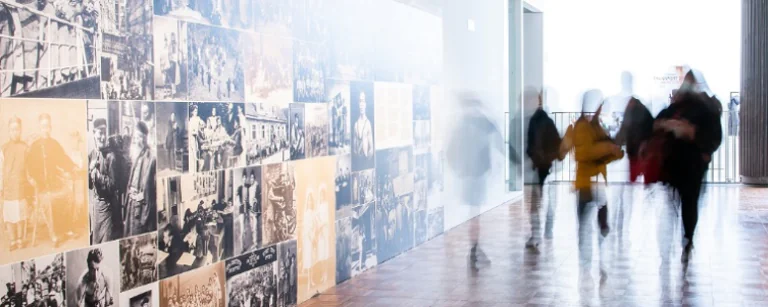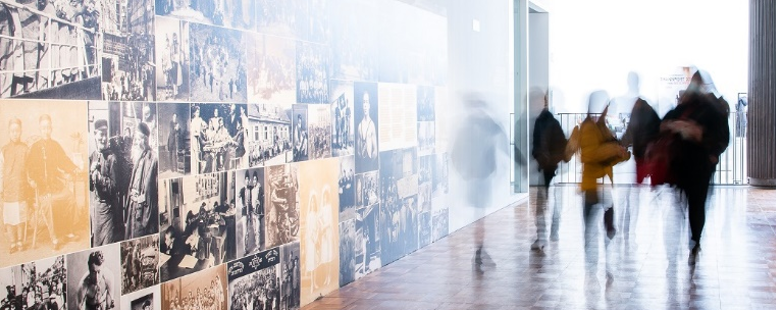


IHRA Grant Call Winners 2024
On this page
We are pleased to announce the winners of the 2024 IHRA Grant Program. These 11 projects will collect and publish new survivor and witness testimonies, develop new toolkits and guidelines for educators and policymakers, tackle online Holocaust distortion, and locate and publish undiscovered historical archives.
This year, the IHRA Grant Program once again drew applications from new organizations who had not previously worked with us. These projects are aligned with one of two central IHRA objectives: safeguarding the record of the Holocaust and the genocide of the Roma, and countering distortion.
Since 2001, the IHRA’s Grant Program has played a critical role in advancing Holocaust remembrance, education, and research across its Member Countries and beyond. Following an external evaluation and a major relaunch in 2023, the program was further strengthened with additional strategic focus, improved outreach, and a simpler application process.
The project will digitally document existing information and monuments of the “Roads of Death” in Northern Moldova and from Chisinau to Transnistria, honoring the memory of 80,000 Jews who died there. The project focuses on mapping Moldavian sites connected to the Holocaust, including killing sites. Once these sites are mapped, they will be shared as part of a virtual tour and exhibition, involving field research, interviews, and the translation of content into multiple languages. The tour will also take place on site, with the visits of several groups of people who will physically walk the routes. With the tour and exhibition available physically in Moldova and globally via the internet, the project will commemorate the Holocaust in Moldova, combat Holocaust distortion, and contribute to Yad Vashem’s virtual exhibitions.
Applicant: Agudath Israel in Moldova.
Partnering organizations: Yad Vashem, Israel, Elie Wiesel Institute for the Study of the Holocaust, Romania, and the Ministry of Culture, Moldova.
The project aims to discover archival documents and establish evidence of the genocide of the Roma in Eastern Europe during the Second World War. The project team will collect testimonies from the oldest surviving generation of Roma individuals across all partner countries, establish archives to preserve personal histories, and identify execution and mass grave sites within these regions. A special toolkit will be created to support educators and researchers in multiple languages. The project’s online collection will include selected archival documents, recorded testimonies of individual witnesses, and a list of identified killing sites. These materials will be made available on a website featuring an interactive map illustrating the project’s findings. Seeking to establish proper memorials at genocide sites, the project promotes public recognition of the genocide of the Roma in Eastern Europe.
Applicant: Roma Community Center (RCC)
Partnering organizations: Amaro Drom e.V, Berlin, Fundacja Jaw Dikh, Poland, Romu Kultūras Centrs, Latvia, Academy of Life Practice, Lithuania, Roma Advocacy and Research Center, Slovakia, and the Department of National Minorities to the Government of the Republic of Lithuania (particip.org).
The project consists of four online courses on the Holocaust and the Roma genocide, antisemitism, and antigypsyism in the Balkan region, along with an in-person seminar in Skoplje and Belgrade. The recorded lectures will help create an educational platform and a lasting resource for future learners, encouraging critical thinking and promoting tolerance and empathy. Drawing on IHRA resources such as the toolkit against Holocaust distortion, the courses will provide its participants with historically accurate accounts and document well-researched information to prevent the dissemination of false narratives. Addressing the unique regional and historical contexts of the Holocaust in the Balkan regions, the project will result in the creation of the first online courses on the Holocaust and the genocide of the Roma for this region in local languages.
Applicant: Haver Srbija
Partnering organizations: Holocaust Fund of the Jews from Macedonia
This project empowers Roma youth to document and disseminate the true history of the Roma genocide. Through the collection of oral histories, the creation of multimedia archives, and the production of educational content, this project aims to counteract the distortion and historical amnesia surrounding the genocide of the Roma. It preserves records and testimonies from the Roma community through a digital archive and uses educational materials to share them. The project traces the connection between the preservation of memory regarding the genocide and the formation of Roma civil society in Ukraine, focusing on the empowerment of marginalized groups. It also studies how preservation of archival records has contributed to the establishment of Roma NGOs and civic engagement among community representatives, particularly youth.
Applicant: Kherson City Association of Young Roma
Partnering organizations: Fundacja Jaw Dikh
The project will result in the creation of a detailed model of the Riga Jewish Ghetto during the Second World War. The former Riga Ghetto territory is a rare piece of living history, spans nearly 2500 square meters, and has since been transformed into a residential area. The scale of the model will not only capture the layout and dimensions of the area accurately but will also offer visitors a comprehensive understanding of life in the ghetto through the usage of digital media and other features. Information will be gathered through research in Latvian and foreign archives. The completed model will become part of the permanent exhibition at the Riga Ghetto Museum in Latvia. The project also includes the creation of a website with the 3D model, digital content alongside traditional forms of interaction with visitors at the Museum, educational programmes, and scientific publications.
Applicant: Shamir Association
Partnering organizations: Riga Technical University, Sara Nussbaum Centre.
The project will result in a collection of filmed, oral, and written testimonies from witnesses and witness descendants of the persecution of Roma communities in France during the Second World War. 40 interviews have been filmed with the last living witnesses and descendants of witnesses since 2019. The project has brought together a collection of recorded or written testimonies from 33 testimonial collections, representing several hundred hours of audiovisual recordings and involving around 280 witnesses. The collection will be permanently preserved at the French National Archives. A website will be created to feature project objectives, achievements, testimony extracts, and historical data. The project will symbolically mark the entry of the featured testimonies into the heart of French national memory.
Applicant: École des Hautes Études en Sciences Sociales/School of Advanced Studies in Social Sciences (EHESS)
Partnering organizations: Archives Nationales, Paris, The Encyclopedia of the Nazi Genocide of the Sinti and Roma in Europe / Edition on the Nazi Genocide of the Sinti and Roma, Universität Heidelberg, Heidelberg.
This project will be a continuation of the work that ARCA started in 2022 in collaboration with “Aid Network for Survivors of Nazi Persecution in Ukraine.” A database was established that includes contacts of over 100 Roma Holocaust survivors in Ukraine, and 8 survivors among them already were interviewed during 2023 with the support of the EVZ fund. The project will result in the creation of a digital archive of video and audio testimonies of Roma survivors collected during individual recording sessions across Ukraine. The project aims at recording 30 interviews by visiting the residences of elderly survivors. Using testimonies, the team will plan online and offline workshops with the project partners. The project ensures the preservation of at-risk archival materials and engages decision-makers to promote recognition of the Roma genocide in Ukraine during the Second World War.
Applicant: Youth Agency for the Advocacy of Roma Culture “ARCA”
Partner organizations: KONTAKTE-KONTAKTbI e.V., Germany, Fortunoff Video Archive for Holocaust Testimonies, United States, and the National Historical and Memorial Preserve Babyn Yar.
This project will safeguard the Holocaust record by mapping and documenting unidentified and poorly known Holocaust-related areas, including killing sites, in Latvia and Lithuania. It will use a multidisciplinary approach to find and analyze remnant features of Holocaust related sites using non-invasive technologies such as low-level remote sensing. With archival research and survivor testimonies, the project will add new information to the knowledge base about the Holocaust in Lithuania, and six Latvian sites, including Skede, Liepaja, Jungfernhof, Salaspils, Tukums, and Rezekne. The data will be collected onsite using non-invasive technologies to detect the remnants that exist below the surface at known and suspected Holocaust sites. The collected data will be interpreted to develop and disseminate a more comprehensive knowledge of Holocaust history in Latvia and beyond.
Applicant: Duquesne University of the Holy Spirit
Partner organizations: Museum of the Jews in Latvia
The history of Sephardic communities during the Holocaust remains poorly documented. This project will organize the first summer school focusing on teaching and researching this history during the Holocaust in Southeastern Europe. The program will use comparative and interdisciplinary approaches to combine methodologies from various fields, produce a nuanced understanding of Sephardic community experiences, and stimulate new avenues of research. The summer school will be held at the premises of the University of Rijeka in September 2025 and bring together 25 students and scholars from Southeastern Europe. The school will be established every two years and will provide educators and students with pedagogical tools to incorporate Sephardic history into curricula, public discourse, and research agenda.
Applicant: University of Rijeka, Faculty of Humanities and Social Sciences
Partner organizations: University of Rijeka, Faculty of Humanities and Social Sciences, Rijeka, Croatia, Institute for Philosophy and Social Theory, Belgrade, Serbia, and Faculty of Humanities and Social Sciences, Kraguljevac, Serbia.
This project investigates the untold stories and experiences of Sephardic women from Greece who were imprisoned for several months in Block 10 at Auschwitz-Birkenau starting in March 1943. Subjected to horrific medical experiments, these women remain largely overlooked in Holocaust history. By pursuing several investigative avenues to reconstruct their lives and experiences, the “Tripas amargas” project will also investigate the lasting emotional impact of the Holocaust atrocities on the second generation of female Sephardic survivors. It will include archival research, collection of medical and administrative documents to reconstruct the life trajectories of the women, testimony analysis, and interviews with survivor descendants. The findings will be published in Hebrew, Polish, English and Greek to ensure accessibility.
Applicant: Salti Institute for Ladino Studies, Bar-Ilan University, Israel
Project Partner: Auschwitz-Birkenau State Museum
This project examines how students from several European universities in Belgium, France, Spain, and Poland are influenced by public words, slogans, and expressions referencing Holocaust history and memory. Within the context of student mobilization to support Palestinian victims of the Israel army’s intervention in Gaza from Fall 2024 to Spring 2024, a quantitative survey will be done to measure the prevalence of certain terms and phrases among students in disciplines where mobilization has been strong. It will also assess student awareness of the issues related to the use and normalization of these expressions. The project will also include interviews with students for detailed analysis and eventually bring together all project partners in a workshop to share findings, and form deliverables to inform decision-makers, educational policymakers, and higher education institutions.
This project has received the Professor Yehuda Bauer Grant for 2024.
Applicant: Yahad In – Unum
Partner organizations: University of Tolouse, Jagellonian University, University of Liege, University of Strasbourg, and Autonomous University of Barcelona



